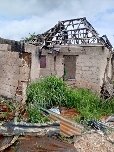I write these words with a heavy heart and trembling hands, having just seen fresh images of my beloved village, Allawa—one year and four months after the military suddenly withdrew from the community. The land that once breathed with life, laughter, and tradition now lies in silence, overshadowed by terror and neglect.
Allawa is not just any place—it is home. A land rich in agriculture, abundant in solid minerals, and blessed with a vibrant cultural heritage. But all of that means nothing today. On June 12, 2014, our fate was sealed when the Allawa military base was unexpectedly dismantled. With no explanation, no transition, and no protection, our people were left vulnerable—abandoned to face terrorists alone.
The aftermath was catastrophic.
Elderly men, women, and children fled in terror—many on foot, trekking over 90 kilometers to Erena and other towns, seeking refuge. They left behind their homes, their farms, their livelihoods—and a lifetime of memories.
This is not just a security failure; it is a betrayal of the social contract. A government that cannot protect its citizens has failed in its most sacred duty.
What Allawa faces today
1. Terror without end
Allawa and its neighboring communities—Kurebe, Kushaka, Bassa—have become battlegrounds for extremist groups. Boko Haram, ISWAP led by one Malam Sadiqu, and rival militias under Dogo Gide operate openly, vying for dominance. The state’s silence has become their strength.
2. Displacement and enslavement
Thousands have been displaced. Those left behind are forced to work under terrorist control—modern-day slavery on farmlands seized by the very people who destroyed their homes.
3. Strategic neglect
From Kushaka to Allawa, the military withdrew in phases, handing our region over, piece by piece, to armed men. It was not just a tactical move; it was a death sentence for our communities.
4. A Humanitarian emergency
The consequences are devastating. With no access to healthcare, food, or shelter, displaced persons are dying of preventable conditions—vomiting, diarrhea, high blood pressure, and untreated infections. We are burying our people not because they are old, but because they are abandoned.
5. The death of education
Schools are shut. Children roam in search of food, not books. Many now mine or farm under duress. Not by choice—but because survival has become the only subject they study.
We, the people of Allawa, Kurebe, Bassa, and other affected communities, are not militants. We are farmers. We are fathers, mothers, children. We are citizens of Nigeria—peaceful, proud, and patient.
But our patience is wearing thin.
We ask, with all the strength left in our hearts: Where is our government? Where is our rescue?
We do not seek pity—we seek justice. We do not want handouts—we want protection. We do not want to remain IDPs—we want to return home.
We are calling on:
- President Bola Ahmed Tinubu
- Niger State Governor Mohammed Umaru Bago
- The Nigerian Armed Forces and Police
- NEMA, SEMA, and other humanitarian organizations
Please do not let Allawa die in silence.
Do not let terrorists become landlords of our ancestral lands.
We have waited long enough. The time to act is now.
ALLAWA must not be forgotten.
Tafeedan Kasan Allawa
August 5, 2025


